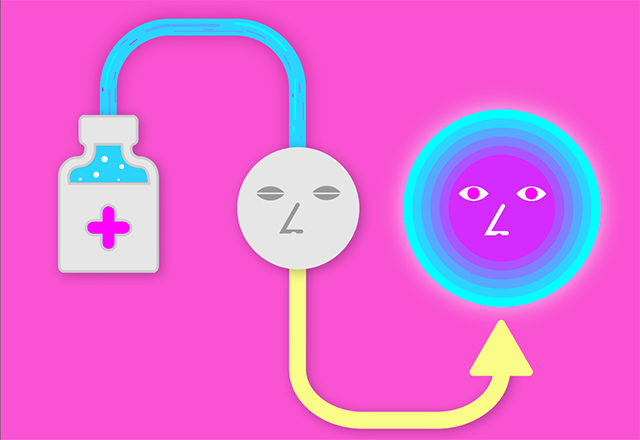Everything from shrooms and weed to molly and ketamine — once known mainly as party drugs — is finding a place in clinical trials for depression and other mental health conditions. Precisely how they work on the brain, however, strays wildly from prescription antidepressants. In doing so, these drugs are challenging traditional ideas of how we understand and treat depression.
You’ve probably heard bits and pieces about how depression works: In short, neurotransmitters such as serotonin and dopamine play central roles in mood. When these neurotransmitter levels fall, we get depressed. That’s why doctors prescribe SSRIs — selective serotonin reuptake inhibitors — to increase serotonin. Drugs that target serotonin, however, don’t work very well. They’re slow — taking four to six weeks to kick in. They’re not always effective: Only a third of people improve on the first antidepressant they take; less than two-thirds of people get better after trying four antidepressants. That’s why researchers continue to look for alternative treatments. At Johns Hopkins, Adam Kaplin is looking at over-the-counter cough syrup: Dextromethorphan (DXM).
DXM, purportedly, has potential for treating depression because it works like ketamine, perhaps the most successful street drug thus far repurposed for depression. Where other antidepressants fail, ketamine appears to work — in days, sometimes even hours. Its effects also last long after the drug leaves the body. Preliminary data show that DXM acts just as quickly.
“Given that it was approved in 1958, over-the-counter for cough no less, it has a proven record as relatively safe,” Kaplin says. “Research says DXM has both serotonin and ketamine-like actions. It’s well worth investigation.”
DXM is particularly attractive as a potential antidepressant because it’s a glutamate blocker (like ketamine) and a serotonin booster (like common antidepressants). Its legal status and established safety, however, give it a huge leg up against other novel antidepressants like ketamine.
Kaplin’s team at Johns Hopkins hopes to explore soon how long and at what dose DXM might have antidepressant effects in humans. While risky, Kaplin is confident his team can pull it off, as the Kaplin lab has long specialized in experimental antidepressant research, including on ketamine. Kaplin has a long history with ketamine, having run five trials in 10 years — long before it was seen in a positive light. Despite his investment in DXM, he maintains a scientist’s skepticism. “Historically, there are many things that made total sense until we tried them,” he says. “Until you see double-blinded studies, I wouldn’t bet the farm.”
The landscape, however, grows ever more promising. DXM has earned increasing attention in case reports and reviews of neurological disorders. Also, there are countless accounts online of people surreptitiously taking DXM for their otherwise treatment-resistant depression. If such effects withstand examination of a controlled, double-blind investigation, we’d have the first widely available fast-acting antidepressant, free from the narrow safety margin and controlled status of ketamine. But as Kaplin says, it’s too early to say.
Want to read more from the Johns Hopkins School of Medicine? Subscribe to the Biomedical Odyssey blog and receive new posts directly in your inbox.
